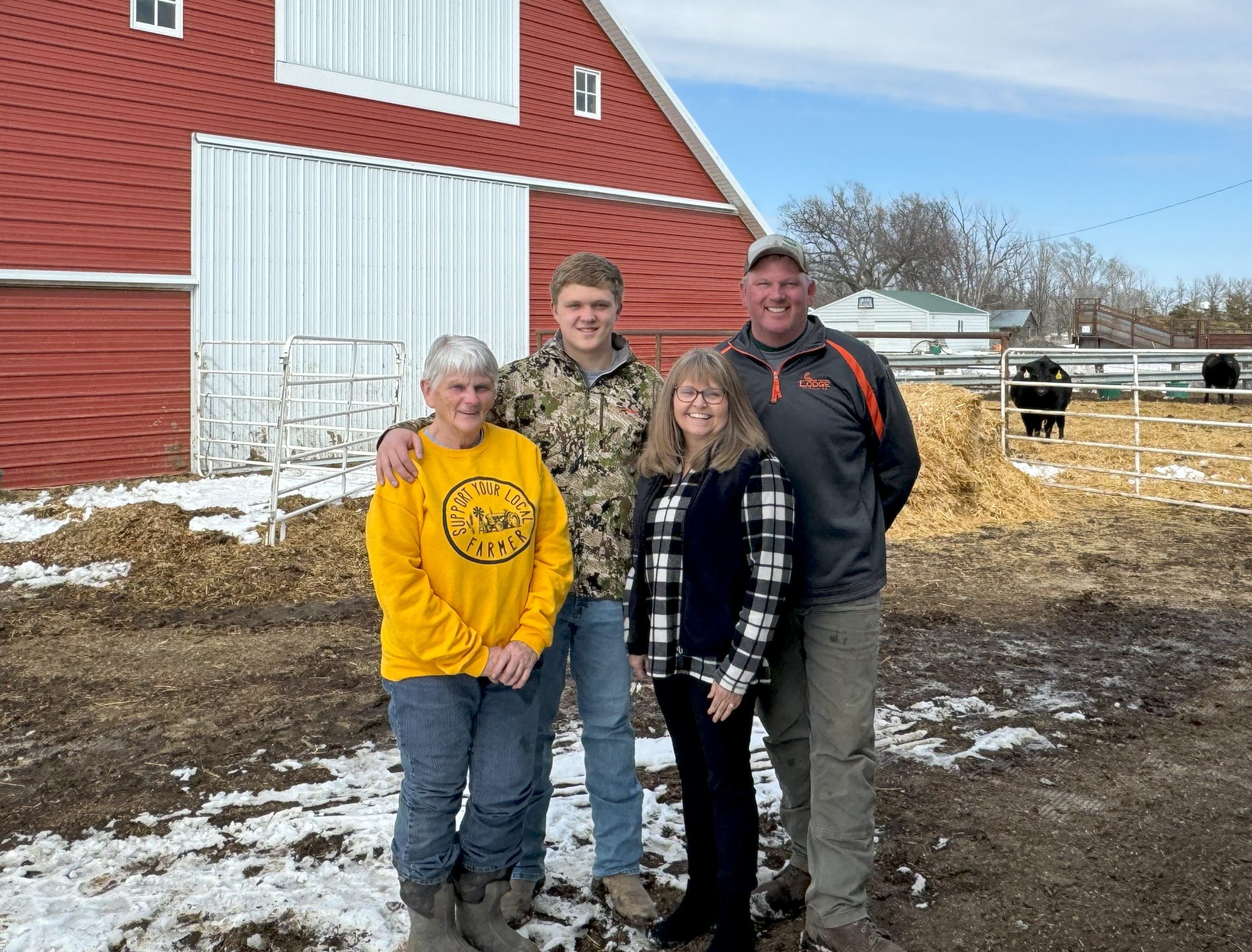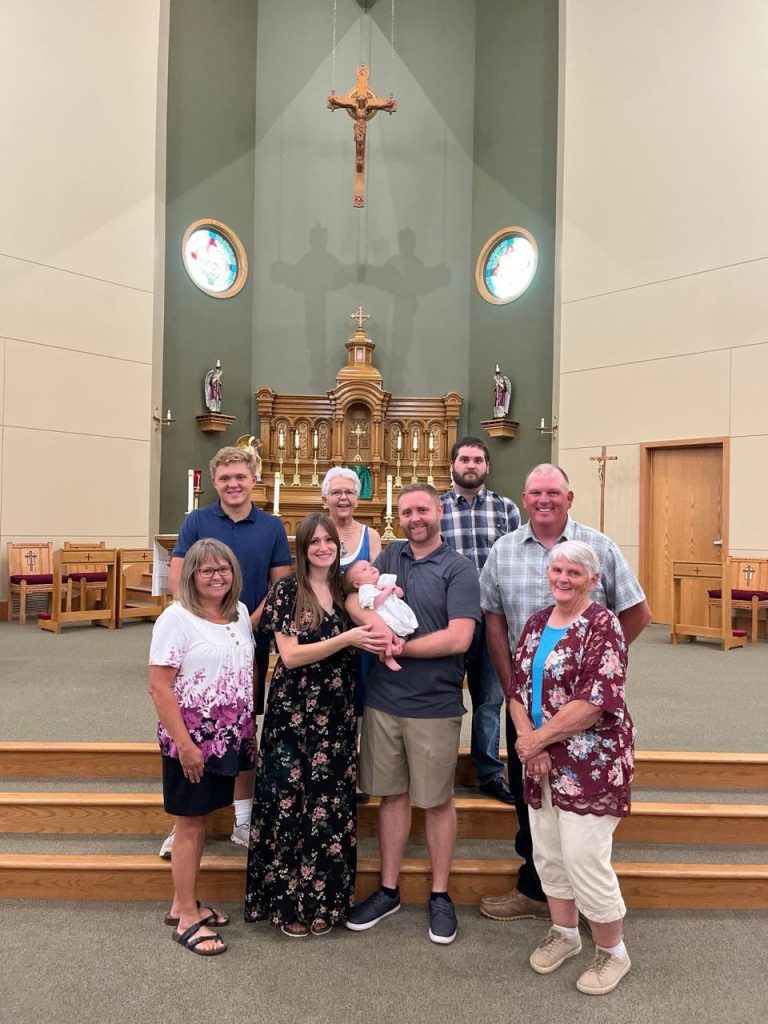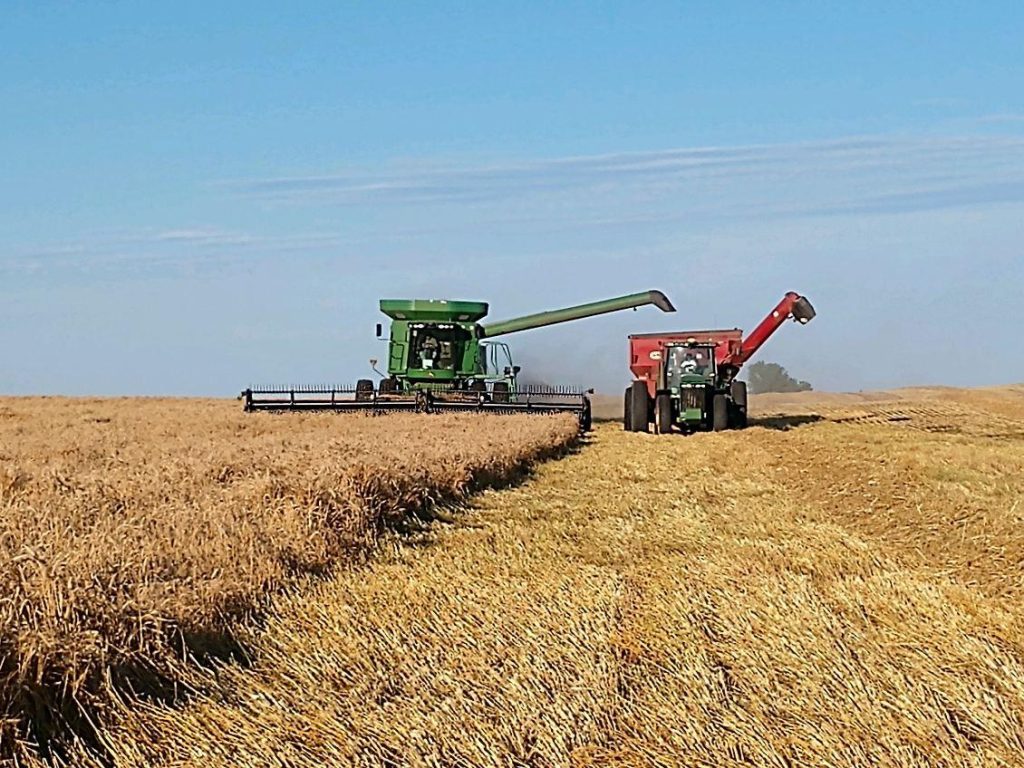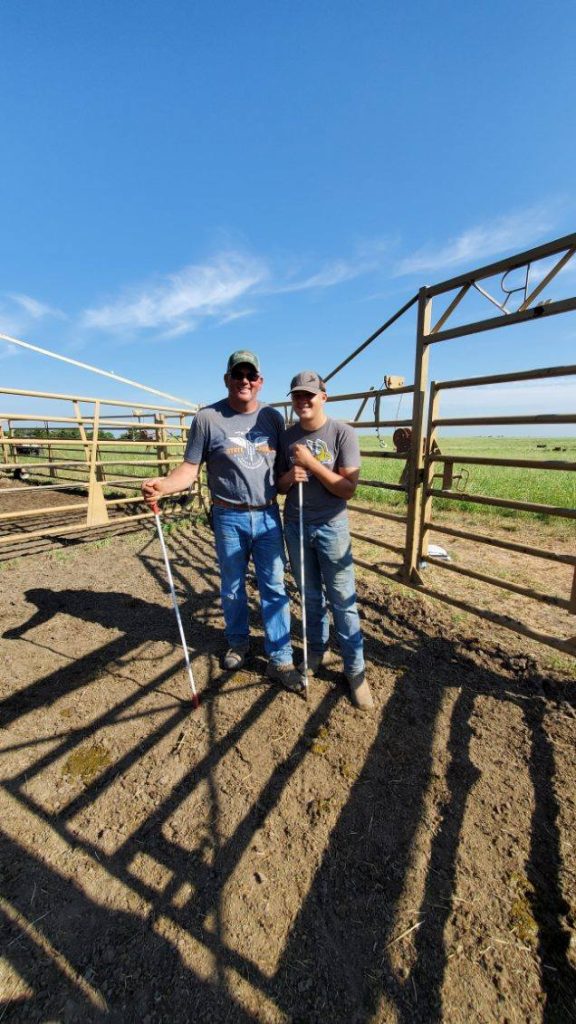Holan Farm Family

By Lura Roti for South Dakota Farmers Union
Calving is underway on the Holan family farm near Pukwana. And like most South Dakota family farms, calving marks the first of many seasons. Once the calves are on the ground, it will be planting season, and then harvest. But unlike most, the Holan Farm has an extra season – Hunting Season.
“Mike goes from doing chores in the morning, to the lodge to take the hunters out, then he jumps in the combine to harvest. He gets up in the morning and starts it all over again,” explained Mike’s wife, Linda Marie.
“Hunting season is very, very busy,” Mike confirmed.
Thankfully, Mike is not alone. The entire family chips in. Linda Marie and Mike’s mom, Linda Kay, clean the lodge and prepare all the hunter’s meals. Mike’s sister, Paula, and her daughters help with breakfast, Mike’s sisters, Anita and Kim, and nieces, Lizzie and Tatlin, clean the birds and Mike’s nephew, Javen, and youngest son, Graden bring their dogs out to help on hunts.
“It’s a big family affair,” explained Linda Marie.
The Country School Lodge opened its doors in the late 1990s, shortly after Mike returned home from Mitchell Tech to farm full time with his dad, Dennis, and Grandpa Lawrence.
A few years prior, the Kimball School District closed the Richland Country School. So, the Holan family purchased the land and building because they had a special connection. Not only did Mike and his sisters, Paula, Kimberly and Anita, all attend the country school, but Mike’s great-grandpa Mike donated the land for the school decades earlier.
“I needed a place to live, so I fixed up the upstairs into an apartment,” Mike said. “There was so much room left unused, and hunting lodges were going up everywhere around us, so we decided we would not be out too much and should give it a try.”
Although hunting season is a lot to manage, the family enjoys the relationships they build with hunters.
“It’s like a family reunion every weekend. These guys watched our boys grow up,” Linda Marie explained.
She added that seeing their farm through the hunters’ eyes is also rewarding. “They say how gorgeous our land is and they take pictures of sunsets. And there are times when I’m bringing the lunches out to them, and I stop and look and think, ‘it is beautiful out here.’”
Over the years, the farm’s hunting business has expanded by word of mouth. “The supplemental income is helpful. Anything you can do to bring in more dollars for the farm,” Mike said.
Mike is the fifth generation Holan to raise crops and cattle on the land. Working to ensure the farm is viable should their son, Graden, want to take over one day is important to Mike and Linda Marie.
Sitting around Linda Kay’s kitchen table, the family talks about the farm’s history as well as its future. Linda Kay’s home was built in 1902 by Mike’s namesake, great-grandpa Mike. Just across the farmyard, the barn he built in 1905 still stands.
Mike’s grandparents, Lawrence and Evelyn, raised his dad, Dennis, in the home. It’s also the home where Linda Kay and Dennis raised their four children.
“Until mom and dad moved in, it did not have any running water. I remember as a kid, if you had to pee, you peed in a bucket or you used the outhouse,” Mike recalled.
Plumbing was installed in 1987 when Linda Kay and Dennis moved their family into the home.
Grandpa Lawrence was frugal. “Grandpa was not big on upgrading machinery, he ran them until there was literally nothing left of them – you cannot do that these days,” Mike said.
In addition to raising crops and cattle, Lawrence and Evelyn kept the farm afloat with their custom combining business. “When I married Dennis, they combined from Oklahoma to Canada with those old Gleaner combines,” Linda Kay said.
“In those days the combines did not have cabs. I can’t imagine driving one of those,” Mike said.
Linda Kay actually met Dennis when he was combining the neighbors’ fields. She grew up on a farm near Bijou Hills, a tiny town between Pukwana and Academy. The couple combined with Dennis’ parents the first nine years of marriage. When the family quit custom combining, they expanded the farming operation by building a hog barn.
The farm and its work have always been a team effort. In addition to working as a teacher’s aide, Linda Kay and the kids worked right alongside Dennis. “Raising the kids on the farm taught them work ethic,” Linda Kay said. “We raised hogs and all the kids would come out and help us grind feed, clean grain bins or hog pens.”
Linda Marie feels much the same about the opportunity the farm provided to her three sons: Ethan, Alex and Graden.
“It’s nice that they could be out in nature, help with chores and we didn’t have to worry about being in town and wondering what they were doing,” said Linda Marie, who juggles hunting lodge and farm responsibilities along with a full time job at the local school.
Today the two older sons have careers off the farm, but they still return home to help with chores or hunt. Because the Holan farm is just a few miles from Mike’s sister, Paula Gussing’s farm, Graden’s cousins chip in to work with him when the family needs extra help.
“When we kick pairs out with four wheelers our nieces and their boyfriends come out to help Graden. They call it their ‘favorite holiday,’” Mike said. “We adults sit on the side and watch them work.”
Graden is a high school junior and said he enjoys helping out with cattle chores and the hunting lodge. Active in FFA, Graden has been building up his own herd that he started with a $5,000 Farm Service Agency youth loan



He and Linda Kay also manage a trapline together.
“Grandma taught me. She always had a few traps set up and I would go check them with her,” Graden said. “It’s nice that I get to see my grandma every day.”
Linda Kay said once Game, Fish & Parks started offering $10 a tail, she and Graden put out more traps.
“I like farm work – whether it is running the drill at planting or feeding cattle,” said Graden who plans to attend Mitchell Technical College and study agronomy and general agriculture.
Although the family farm is important to him, right now, Graden’s focus is on school and athletics – he plays football, basketball as well as spring and summer baseball.
“They call him, ‘farm strong,’” Mike said. At 17, Graden does not yet know what he wants to do full time after college. The idea that he may want to return to the family farm is one that makes Mike happy.
“It’s super awesome. I love working with him,” Mike said. “Just the other day we were pushing posts and when we got done, Graden said, ‘lets staple them up quick.’” Once we were done, he asked, ‘do you mind if I go fishing?’ I said, ‘of course, go fish.’ Having our farm so close to the river why not enjoy it?’”
Their farm is just 23 miles from the Missouri River.
Reflecting on what he gained from growing up on the farm, working beside his Dad and Grandpa, Mike said, “There was nothing else I wanted to do but farm. I knew dad and grandpa wanted me back. I enjoy being my own boss. As long as you work hard and get things done and the banker is happy, it all works out.”
Mike ended up taking on much more farm responsibility, much sooner than he anticipated, when pancreatic cancer took his dad, Dennis, in 2005. Dennis was only 59. He passed away just 10 days after Mike and Linda Marie’s wedding.
With the future of the farm and pheasant habitat in mind, the family continues a long tradition of land stewardship. They are focused on conservation practices like rotational grazing (they rotate their herd every 10 days), no-till farming and planting a diverse crop rotation of oats, winter wheat, corn, soybeans and milo. (To learn more about family’s philosophy on conservation, watch the video below)
Prior to growing season 2023, the family raised milo mostly for the pheasant foodplots. Mike decided to raise more acres of milo because it is drought tolerant, and the local elevator has access to horse feed and bird seed markets.
“I talked with the seed rep, and milo seed is cheaper, the chemical needs are about the same, crop insurance is cheaper and the market is solid,” Mike explained. “And the pheasants like it, so it’s a win-win.”

